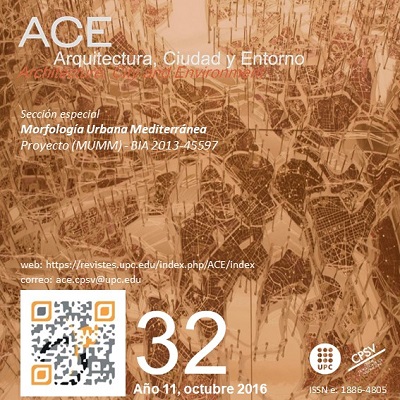Urban heat island prediction in the mediterranean context: an evaluation of the urban weather generator model
DOI:
https://doi.org/10.5821/ace.11.32.4836Keywords:
Urban climate, climate model, energy simulation, urban contextAbstract
The lack of urban-specific climate data is, today, one of the major limits for an accurate estimation of the building energy performance in the urban context. The urban climate is substantially modified by the “heat island” effect that determines an increase of the air temperature compared to the surrounding rural areas. By contrast, the weather data used to run the energy simulations normally refer to rural or suburban weather stations, causing relevant errors in the energy assessment, especially in hot climates.
This study aims at evaluating the accuracy of the "Urban Weather Generator" (UWG), a model developed for generating urban weather files from rural weather data in order to improve the accuracy of the building energy simulations in the urban context.
To this purpose, the model predictions have been compared to actual observations in different urban sites in Rome and Barcelona. The comparisons have been conducted for one year of observations for each site, focusing the analysis on summer and winter months. The model accuracy has been assessed through statistical analysis of the average error.
Results show that the UWG model is able to capture the general trend of the urban temperature. The accuracy of the prediction increases for urban sites located in a rather homogeneous urban fabric in terms of building density and vegetation coverage. In these situations, the model allows a good prediction of the urban air temperatures with low computational requirement and it can be a useful tool to improve the accuracy of urban energy analysis.
Published
Issue
Section
License
| INTELECTUAL PROTECTION CRITERIA |
At this moment, it is count with the "Oficina Española de Patentes y Marcas", while global protection it is being processed by the World Intelectual Property Organization (OMPI/WIPO). Nevertheless the International Standard Serial Number Office (ISSN) has given the following numbers ISSN: 1886-4805 (electronic version) and 1887-7052 (paper version). All articles will be peer reviewed, using double blind reviewing. |
| COPYRIGHT |
The article contents and their comments are authors exclusive liability, and do not reflect necessarily the journal editor commitee's opinion. All ACE published works are subject to the following licence CC BY-NC-ND 3.0 ES http://creativecommons.org/licenses/by-nc-nd/3.0/es/ It implies that authors do not hold nor retain the copyright without restrictions but only those included in the licence. |


































